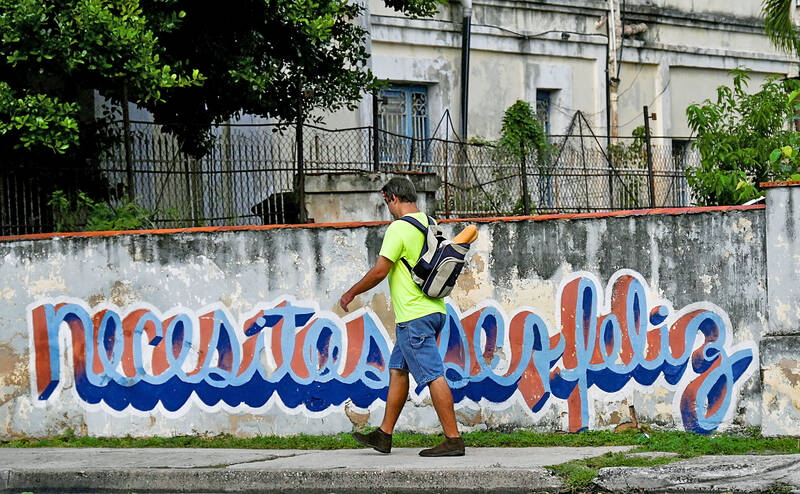Graffiti on walls around Havana telling Cubans “you need to be happy” has encouraged introspection and inspiration in a country where censorship has forced many street artists to emigrate or abandon their work.
The simple but striking message that began appearing more than a year ago is the creation of “Mr. Sad,” a 27-year-old sociologist who, under the cover of anonymity, pushes the limits of rebellion on the communist-run island.
“My intention is just to create a mirror so that people have the opportunity to take a moment to see what’s inside them,” he said.

Photo: AFP
The artist said he was inspired by the tradition of visual propaganda that Cuba has cultivated in the decades since the revolution that brought the late Cuban president Fidel Castro to power in 1959.
Revolutionary slogans that have adorned public space on the island of 10 million inhabitants for years, such as “Homeland or death, we will win,” have gradually lost their connection with the Cuban identity, he said.
In the 1960s, “Cuba became the standard bearer of counterculture,” he said in front of his graffiti inside the ruins of what was once an elegant apartment block with a sea view.
“Society has evolved. It no longer identifies with what happens in public spaces,” he said.
He decided to turn his message into an “order but a kind one,” because he believes Cubans are so used to orders “that only an order can attract attention.”
The phrase has been spray-painted or scribbled in pen on walls, road signs and disused shop windows, as well appearing on stickers and T-shirts.
DESPITE THE PROBLEMS
Graffiti emerged in Cuba in the early 2000s as a response to the needs of a changing society, Mr. Sad said.
However, some of its creators have faced hostility and surveillance from the authorities, because graffiti is above all a form of rebellion, he added.
One artist who signs his graffiti featuring masked characters observing society from street walls “2+2=5” has gone into exile.
Another, Yulier P., remains on the island, but no longer paints.
Both were previously arrested and said they were forced to paint over their murals, although some are still visible in the capital.
Even so, Mr. Sad prefers to work during the day, choosing busy places such as bus stations.
He said people had told him on social media that his words helped them to make important decisions, including fleeing domestic violence, addressing gender identity issues or even deciding against suicide.
Independent filmmakers Lilian Moncada, 22, and Erika Santana, 23, were also inspired by the slogan, which they used for the name of their short film.
Santana said she plays the role of a woman “fighting her own demons” who needed to hear Mr. Sad’s message, who has the phrase tattooed on her forearm.
Cubans “have the right to be happy, to look inward and move forward, despite the problems” shaking the island, which is mired in its worst economic crisis in three decades, Moncada said.

The Burmese junta has said that detained former leader Aung San Suu Kyi is “in good health,” a day after her son said he has received little information about the 80-year-old’s condition and fears she could die without him knowing. In an interview in Tokyo earlier this week, Kim Aris said he had not heard from his mother in years and believes she is being held incommunicado in the capital, Naypyidaw. Aung San Suu Kyi, a Nobel Peace Prize laureate, was detained after a 2021 military coup that ousted her elected civilian government and sparked a civil war. She is serving a

REVENGE: Trump said he had the support of the Syrian government for the strikes, which took place in response to an Islamic State attack on US soldiers last week The US launched large-scale airstrikes on more than 70 targets across Syria, the Pentagon said on Friday, fulfilling US President Donald Trump’s vow to strike back after the killing of two US soldiers. “This is not the beginning of a war — it is a declaration of vengeance,” US Secretary of Defense Pete Hegseth wrote on social media. “Today, we hunted and we killed our enemies. Lots of them. And we will continue.” The US Central Command said that fighter jets, attack helicopters and artillery targeted ISIS infrastructure and weapon sites. “All terrorists who are evil enough to attack Americans are hereby warned

Seven wild Asiatic elephants were killed and a calf was injured when a high-speed passenger train collided with a herd crossing the tracks in India’s northeastern state of Assam early yesterday, local authorities said. The train driver spotted the herd of about 100 elephants and used the emergency brakes, but the train still hit some of the animals, Indian Railways spokesman Kapinjal Kishore Sharma told reporters. Five train coaches and the engine derailed following the impact, but there were no human casualties, Sharma said. Veterinarians carried out autopsies on the dead elephants, which were to be buried later in the day. The accident site

‘EAST SHIELD’: State-run Belma said it would produce up to 6 million mines to lay along Poland’s 800km eastern border, and sell excess to nations bordering Russia and Belarus Poland has decided to start producing anti-personnel mines for the first time since the Cold War, and plans to deploy them along its eastern border and might export them to Ukraine, the deputy defense minister said. Joining a broader regional shift that has seen almost all European countries bordering Russia, with the exception of Norway, announce plans to quit the global treaty banning such weapons, Poland wants to use anti-personnel mines to beef up its borders with Belarus and Russia. “We are interested in large quantities as soon as possible,” Deputy Minister of National Defense Pawel Zalewski said. The mines would be part